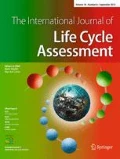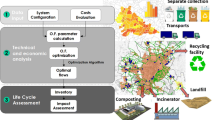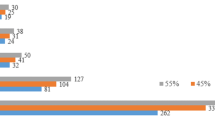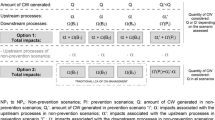Abstract
Purpose
Waste prevention has been assigned increasing attention worldwide during recent years, and it is expected to become one of the core elements of waste management planning in the near future. In this framework, this paper presents and discusses two possible LCA approaches for the evaluation of the environmental and energetic performance of municipal solid waste (MSW) management systems which include the effects of waste prevention activities.
Methods
The two approaches are conceived for the comparison of waste management scenarios including waste prevention activities with baseline scenarios without waste prevention. For both of them, the functional unit is defined and the system boundaries are described with reference to different typologies of waste prevention activities identified in an extensive review. The procedure for the calculation of the LCA impacts of scenarios is also reported and an example illustrating the processes to be included in system boundaries for a specific waste prevention activity is provided.
Results and discussion
The presented approaches lead to the same result in terms of difference between the LCA impacts of a waste prevention scenario and of a baseline one. However, because of the partially different upstream system boundaries, different values of the impacts of single scenarios are obtained and the application of the two approaches is more suitable in different situations and in analyses with different purposes. The methodological aspects that can complicate the applicability of the two approaches are discussed lastly.
Conclusions
The environmental and energetic performance of MSW management scenarios including waste prevention activities can be evaluated with the two LCA approaches presented in this paper. They can be used for many purposes such as, among the most general, evaluating the upstream and downstream environmental consequences of implementing particular waste prevention activities in a given waste management system, complementing waste reduction indicators with LCA-based indicators and supporting with quantitative evidence the strategic and policy relevance of waste prevention.

Similar content being viewed by others
Notes
Actually, an equivalent new good is prevented in its entirety only if its average lifespan is identical to the duration of the second life of the reused good, or of the additional life of the good the lifespan of which has been extended. If these latter are shorter or longer than the former, only a fraction (smaller or greater than 1) of the equivalent new good is actually prevented. It is equal to the ratio between the duration of the second life of the reused good (or the duration of the additional life of the good the lifespan of which has been extended) and the average lifespan of the equivalent new good. This is not very close to the reality, where waste is defined by integer quantities, but it is a possible modelling approach also reported in the guidelines prepared by the Joint Research Centre of the European Commission (2011).
This is valid also for Approach 1, even if not explicitly stated during the description of the system boundaries adopted in a waste prevention scenario according to this approach.
In the case of reuse and lifespan extension of existing goods only additional upstream impacts are generally involved.
References
Abduli MA, Naghib A, Yonesi M, Akbari A (2011) Life cycle assessment (LCA) of solid waste management strategies in Tehran: landfill and composting plus landfill. Environ Monit Assess 178:487–498
ACR+ (2010) Quantitative benchmarks for waste prevention. A guide for local and regional authorities in support of the new Waste Framework Directive. Association of Cities and Regions for Recycling and sustainable Resource management (ACR+), Brussels
Antonopoulos I-S, Karagiannidis A, Tsatsarelis T, Perkoulidis G (2012) Applying waste management scenarios in the Peloponnese region in Greece: a critical analysis in the frame of life cycle assessment. Environ Sci Pollut Res. doi:10.1007/s11356-012-1139-y
Beccali G, Cellura M, Mistretta M (2001) Managing municipal solid waste: energetic and environmental comparison among different management options. Int J Life Cycle Assess 6:243–249
Blengini GA, Fantoni M, Busto M, Genon G, Zanetti MC (2012) Participatory approach, acceptability and transparency of waste management LCAs: case studies of Torino and Cuneo. Waste Manage 32:1712–1721
Bovea MD, Powell JC (2006) Alternative scenarios to meet the demands of sustainable waste management. J Environ Manage 79:115–132
Bovea MD, Ibáñez-Forés V, Gallardo A, Colomer-Mendoza F (2010) Environmental assessment of alternative municipal solid waste management strategies. A Spanish case study. Waste Manage 30:2383–2395
Buttol P, Masoni P, Bonoli A, Goldoni S, Belladonna V, Cavazzuti C (2007) LCA of integrated MSW management systems: case study of the Bologna District. Waste Manage 27:1059–1070
Chaya W, Gheewala SH (2007) Life cycle assessment of MSW-to-energy schemes in Thailand. J Clean Prod 15:1463–1468
Cleary J (2010) The incorporation of waste prevention activities into life cycle assessments of municipal solid waste management systems: methodological issues. Int J Life Cycle Assess 15:579–589
Cox J, Giorgi S, Sharp V, Strange K, Wilson DC, Blakey N (2010) Household waste prevention—a review of evidence. Waste Manage Res 28:193–219
De Feo G, Malvano C (2009) The use of LCA in selecting the best MSW management system. Waste Manage 29:1901–1915
European Commission (2012) Waste Prevention Best Practices. European Commission. http://ec.europa.eu/environment/waste/prevention/practices.htm
European Commission DG Environment (2010) Analysis of the evolution of waste reduction and the scope of waste prevention, Final report. European Commission DG Environment. http://ec.europa.eu/environment/waste/prevention/pdf/report_waste.pdf
Ekvall T, Assefa G, Björklund A, Eriksson O, Finnveden G (2007) What life-cycle assessment does and does not do in assessments of waste management. Waste Manage 27:989–996
European Parliament and Council (2008) Directive 2008/98/EC of the European Parliament and of the Council of 19 November 2008 on waste and repealing certain Directives. Official Journal of the European Union L 312, 22.11.2008, Brussels, pp 3–30
Federambiente (2010) Linee guida sulla prevenzione dei rifiuti urbani (Guidelines on municipal waste prevention), in Italian. http://www.federambiente.it/Primopiano/LineeGuida/Linee%20Guida%20Racc%20rifiuti%20Urbani.pdf
Finnveden G (1999) Methodological aspects of life cycle assessment of integrated solid waste management systems. Resour Conserv Recycl 26:173–187
Finnveden G, Hauschild MZ, Ekvall T, Guinée J, Heijungs R, Hellweg S, Koehler A, Pennington D, Suh S (2009) Recent developments in life cycle assessment. J Environ Manage 91:1–21
Gentil EC, Gallo D, Christensen TH (2011) Environmental evaluation of municipal waste prevention. Waste Manage 31:2371–2379
Gheewala SH (2009) Editorial: LCA of waste management systems-research opportunities. Int J Life Cycle Assess 14:589–590
Giugliano M, Cernuschi S, Grosso M, Rigamonti L (2011) Material and energy recovery in integrated waste management systems. an evaluation based on life cycle assessment. Waste Manage 31:2092–2101
Gunamantha M, Sarto (2012) Life cycle assessment of municipal solid waste treatment to energy options: case study of KARTAMANTUL region, Yogyakarta. Renew Energy 41:277–284
Hong RJ, Wang GF, Guo RZ, Cheng X, Liu Q, Zhang PJ, Qian GR (2006) Life cycle assessment of BMT-based integrated municipal solid waste management: case study in Pudong, China. Resour Conserv Recycl 49:129–146
Joint Research Centre of the European Commission (2011) Supporting environmentally sound decisions for waste management: a technical guide to life cycle thinking (LCT) and life cycle assessment (LCA) for waste experts and LCA practitioners. European Commission, Joint Research Centre, Institute for Environment and Sustainability, Ispra, Italy. http://lct.jrc.ec.europa.eu/pdf-directory/ReqNo-JRC65850-LB-NA-24916-EN-N.pdf
Kaplan PO, Ranjithan SR, Barlaz MA (2009) Use of life-cycle analysis to support solid waste management planning for Delaware. Environ Sci Technol 43:1264–1270
Koci V, Trecakova T (2011) Mixed municipal waste management in the Czech Republic from the point of view of the LCA method. Int J Life Cycle Assess 16:113–124
Koroneos CJ, Nanaki EA (2012) Integrated solid waste management and energy production—a life cycle assessment approach: the case study of the city of Thessaloniki. J Clean Prod 27:141–150
Liamsanguan C, Gheewala SH (2008) The holistic impact of integrated solid waste management on greenhouse gas emissions in Phuket. J Clean Prod 16:1865–1871
Matsuda T, Yano J, Hirai Y, Sakai S-I (2012) Life-cycle greenhouse gas inventory analysis of household waste management and food waste reduction activities in Kyoto, Japan. Int J Life Cycle Assess 17:743–752
McDougall F, White P, Franke M, Hindle P (2001) Integrated solid waste management: a life cycle inventory, 2nd edn. Blackwell, Oxford
Menikpura SNM, Gheewala SH, Bonnet S (2012) Sustainability assessment of municipal solid waste management in Sri Lanka: problems and prospects. J Mater Cycles Waste Manage 14:181–192
Muñoz I, Rieradevall J, Doménech X, Milà I, Canals L (2004) LCA application to integrated waste management planning in Gipuzkoa (Spain). Int J Life Cycle Assess 9:272–280
Pires A, Chang N-B, Martinho G (2011) Reliability-based life cycle assessment for future solid waste management alternatives in Portugal. Int J Life Cycle Assess 16:316–337
Regione Lombardia (2009) Piano d’Azione per la Riduzione dei Rifiuti Urbani in Regione Lombardia (Action plan for municipal waste reduction in the Lombardia Region). Regione Lombardia, Direzione Generale Reti, Servizi di Pubblica Utilità e Sviluppo Sostenibile (in Italian). http://www.riduciamoirifiuti.regione.lombardia.it/shared/ccurl/746/665/PARR_documento.pdf
Rigamonti L, Grosso M, Giugliano M (2009) Life cycle assessment for optimising the level of separated collection in integrated MSW management systems. Waste Manage 29:934–944
Salhofer S, Obersteiner G, Schneider F, Lebersorger S (2008) Potentials for the prevention of municipal solid waste. Waste Manage 28:245–259
Saner D, Walser T, Vadenbo CO (2012) End-of-life and waste management in life cycle assessment—Zurich, 6 December 2011. Int J Life Cycle Assess 17:504–510
Sharp V, Giorgi S, Wilson DC (2010) Delivery and impact of household waste prevention intervention campaigns (at the local level). Waste Manage Res 28:256–268
Slagstad H, Brattebø H (2012) LCA for household waste management when planning a new urban settlement. Waste Manage 32:1482–1490
Wilson DC, Blakey NC, Hansen JAA (2010) Waste management and research: editorial. Waste prevention: its time has come. Waste Manage Res 28:191–192
Weitz K, Barlaz M, Ranjithan R, Brill D, Thorneloe S, Ham R (1999) Life cycle management of municipal solid waste. Int J Life Cycle Assess 4:195–201
Zhao W, der Voet E, Zhang Y, Huppes G (2009) Life cycle assessment of municipal solid waste management with regard to greenhouse gas emissions: case study of Tianjin, China. Sci Total Environ 407:1517–1526
Zhao W, Huppes G, Van DV (2011) Eco-efficiency for greenhouse gas emissions mitigation of municipal solid waste management: a case study of Tianjin, China. Waste Manage 31:1407–1415
Author information
Authors and Affiliations
Corresponding author
Additional information
Responsible editor: Shabbir Gheewala
Rights and permissions
About this article
Cite this article
Nessi, S., Rigamonti, L. & Grosso, M. Discussion on methods to include prevention activities in waste management LCA. Int J Life Cycle Assess 18, 1358–1373 (2013). https://doi.org/10.1007/s11367-013-0570-8
Received:
Accepted:
Published:
Issue Date:
DOI: https://doi.org/10.1007/s11367-013-0570-8




